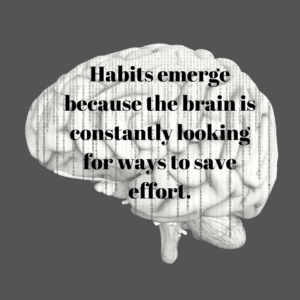
One of the most talked about books over the past year is the New York Times bestseller, The Power of Habit: Why We Do What We Do in Life and Business by Charles Duhigg.
I read this book because I was interested in utilizing habits to reduce the numerous decisions I have to make every day. Every decision I was making reduced my ability to make the next decision. This became quite obvious when I arrived home one night and my lovely wife asked me some very basic questions. I simply replied that I had no energy to answer them right now because I was making too many decisions all day long. The epiphany: the more decisions we make, the more energy we have to use, reducing our ability to make clear and effective decisions later in the day. But, by using habits, we reduce the mental energy we need for simple issues, and reserve our energy for more complex matters.
Duhigg first discusses how habits work, how to create new habits, and why we are able to create new habits.  Habits emerge because the brain is constantly looking for ways to save effort. This book discusses how habits emerge and why they are so powerful. They are based on the same three step loop: the cue, the routine, and the reward.
Habits emerge because the brain is constantly looking for ways to save effort. This book discusses how habits emerge and why they are so powerful. They are based on the same three step loop: the cue, the routine, and the reward.
But this book is more than just about changing an individual’s habits, it discusses how to implement key habits within an organization so they’re all working toward the same goal. One of the best ideas that I believe came out of this book was the fact that creating “keystone habits,” in other words, “small wins” have enormous power. Once these small wins occur, it sets in motion forces that favor additional small wins that keep building upon one another. It’s not too different from the law of physics that says “a body in motion, stays in motion, and a body at rest, stays at rest.” Once you start creating small wins, they will naturally build on one another to create greater and greater impact on the organization. In creating these keystone habits, the author discusses case studies taken from various companies showing how the habits created structure in an organization, provided a routine for employees to follow when they weren’t sure what to do, and gave employees a sense of ownership in the progress of the business.
The book discusses not only how habits are created, but also how to change habits. The author declares that to modify habit, you must decide to change it. There has to be a conscience decision to accept the difficulty and hard work of creating new cues, routine, and rewards. Thank you Captain Obvious. I’m looking for something a little more practical; his comments are a little too highbrow and cerebral. [perfectpullquote align=”full” cite=”” link=”” color=”” class=”” size=””]I’m looking for something a little more practical; his comments are a little too highbrow and cerebral. [/perfectpullquote]
For me to change habits, I need it spelled out clearly and concisely what steps I need to take, andhow to implement these changes. Maybe that just my simple mind at work.
This is an excellent book for understanding the social psychology and science behind habits, but I felt it was lacking in the practical application. However, with the idea of habits now being at the forefront of creating more efficient businesses, and even more efficient workers, there will be no shortage of books on this topic in the future, as well as reading fodder in blogs.



